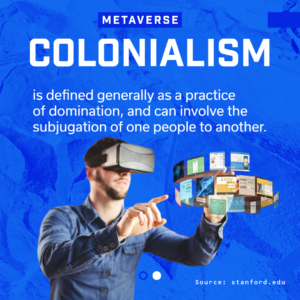Introduction:
The term “metaverse” has been widely used to describe various virtual and digital technologies, such as virtual reality, augmented reality, and online gaming platforms. However, the power of naming something has long been recognized as a tool of colonialism, and the term “metaverse” is no exception. In this article, we will explore how the concept of colonialism has impacted the metaverse, and how capitalist enclosures have affected digital worlds.
The Tech Industry’s Adoption of the Term “Metaverse”:
The term “metaverse” was first coined by Neal Stephenson in his 1992 novel “Snowcrash,” and was later adopted by the tech industry as a catch-all term for various digital and online technologies. Stephenson’s vision of the metaverse highlights the dangers of a digital world where power is concentrated in the hands of a few corporations and governments, perpetuating the same oppressive systems found in the real world. The dystopian world of Snowcrash serves as a warning against the unchecked growth of the tech industry and the concentration of power in the hands of a few individuals and corporations.
The Power of Naming:
The act of naming something is a form of control, and the use of the term “metaverse” by the tech industry allows them to shape the narrative surrounding these technologies. The power of naming is even more pronounced in the digital age, where companies like Facebook and Google control access to resources and technology, perpetuating colonialist ideologies.
Colonialism and Capitalist Enclosures in the Digital Age:
Colonialism is a form of oppression, used to extract resources from a population or to establish and maintain control over them. Capitalist enclosures refer to the process of controlling access to resources and technology, such as the control of the internet by Facebook and Google. This process has been replicated in the digital world, where people of color face discrimination and exclusion in virtual worlds, perpetuating the same racist ideologies found in the real world.
Mark Zuckerberg’s Controversial Actions:
Mark Zuckerberg, the founder of Facebook, has been accused of perpetuating colonialist ideologies. One example is the controversy surrounding his land in Hawaii, where he attempted to gain ownership of ancestral land through the quiet title process, which is a legal loophole that can be used to take ownership of land without the consent of all owners. This sparked outrage from the Native Hawaiian community, who saw it as an attempt to erase their culture and history.
The Applications of the Metaverse:
The applications of the Metaverse are vast and varied. Virtual reality (VR) headsets offer users an immersive experience that makes them feel as though they are in another location entirely, which has numerous uses within entertainment, education, and business. Augmented reality (AR) glasses, on the other hand, offer users an enhanced view of their surroundings by overlaying new information on top of what they see with their own eyes. Video games are the main platforms where metaverse is imagined. None of these were invented or managed by Facebook.
Facebook’s Rebranding as Meta:
By renaming Facebook as “Meta” and publicly pushing the term “Metaverse,” Zuckerberg is invoking the history of colonialism and capitalist enclosures. He is using the power of naming to shape the narrative surrounding the unlimited possibilities of digital space. Most of the platforms included in the Metaverse have no relationship to Meta.
Conclusion:
In conclusion, the power of naming and its impact on digital worlds cannot be ignored. By recognizing the impact of colonialism and capitalist enclosures on the term “metaverse,” we can understand the ways in which corporate forces use language to shape our understanding of technology. However, we must also acknowledge that the term “metaverse” has become widely adopted, and it is difficult to escape its usage. Rather, we should use the term with the knowledge that it represents limitless digital possibilities. By actively working to dismantle systems of oppression in digital spaces, we can create truly inclusive and equitable virtual worlds for all.

